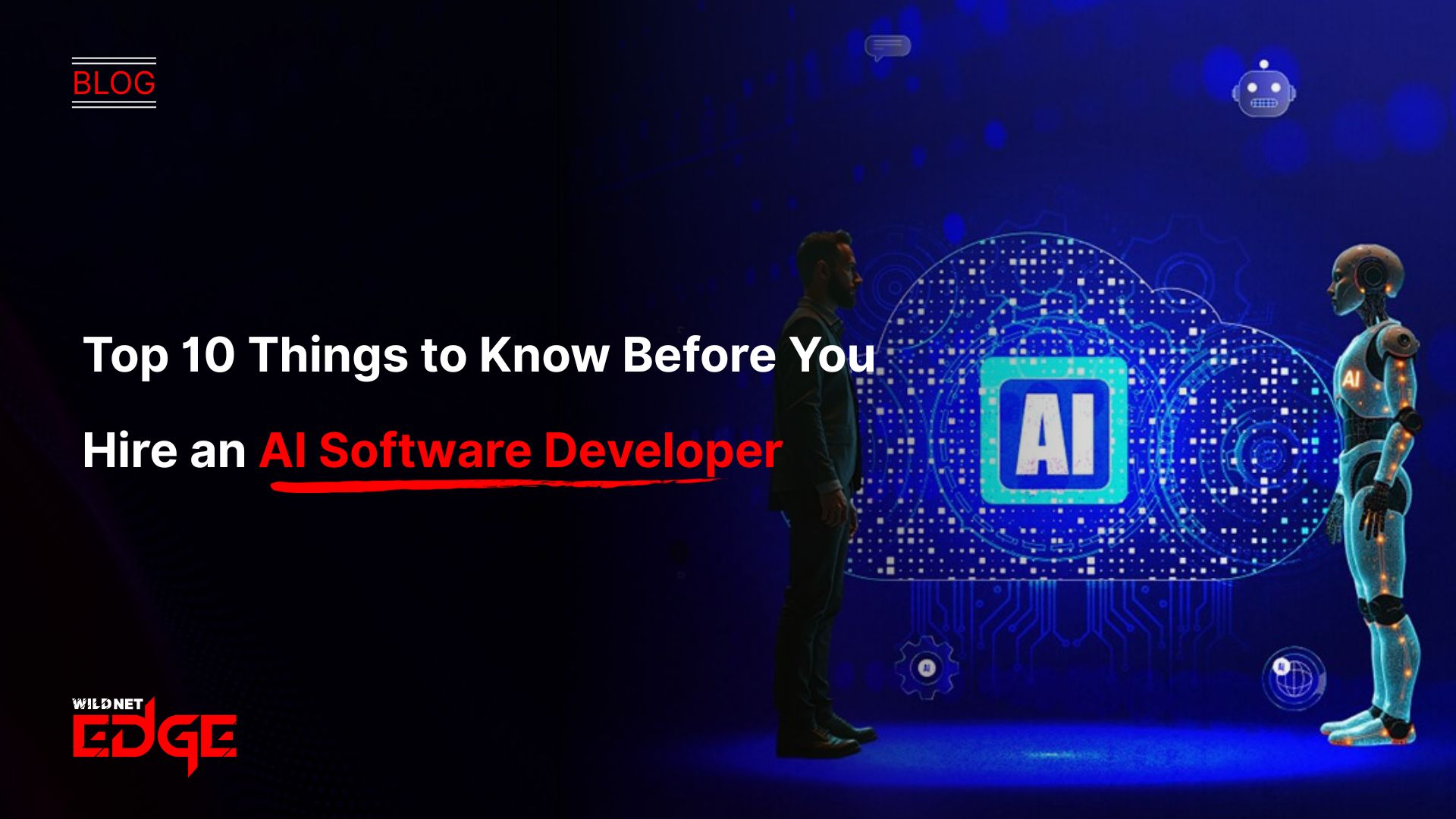Struggling to find the right AI software developer? You’re not alone. Hiring talent in AI software development can be tricky—missteps cost time, money, and project success. In this post, we’ll break down the top 10 must-knows before you hire, so you can build an ai-enhanced development workflow that truly works for you.
Understanding Artificial Intelligence in Software Development
Artificial intelligence is no longer a futuristic concept; it’s embedded within how modern software solutions evolve. Artificial intelligence in software development transforms traditional coding tasks by enabling automation, predictive analytics, and intelligent decision-making embedded directly within applications.
Definition and Scope of AI Software Development
At its core, AI software development involves creating systems capable of performing tasks that traditionally require human intelligence—like learning, reasoning, and problem-solving. This discipline merges conventional software engineering with cutting-edge AI techniques such as machine learning (ML), natural language processing (NLP), and computer vision.
Key AI Techniques and Technologies Used
Leading AI software projects leverage frameworks like TensorFlow, PyTorch, and scikit-learn, integrating algorithms that support supervised, unsupervised, and reinforcement learning. AI models require large datasets to train effectively, followed by iterative refinement to optimize performance.
How AI Changes Traditional Development Workflows
Traditional workflows often rely on static coding and manual testing. In contrast, ai-enhanced development workflows introduce continuous model training, data pipeline management, and model deployment cycles. Developers must handle data preprocessing, model version control, and performance monitoring, creating a more dynamic and iterative workflow.
Actionable Tip:
When interviewing candidates, ask them to describe challenges they faced integrating AI components into legacy systems—this distinguishes developers who understand practical AI application, not just theory.
Evaluating AI-Enhanced Development Workflow Capabilities
The productivity and quality of AI-driven projects depend heavily on streamlined workflows designed to support AI tasks.
Characteristics of Optimized AI Workflows
Efficient AI workflows combine robust data engineering, automated model testing, and scalable infrastructure for model deployment. They emphasize reproducibility, versioning of both code and models, and real-time monitoring to detect drifts or degradations in AI model performance.
Tools and Frameworks Driving AI Software Development
2025 tools prioritize seamless integration and scalability. These include:
- MLflow for managing machine learning lifecycle
- Kubeflow for AI pipeline orchestration on Kubernetes
- Cloud-native AI services such as AWS SageMaker, Azure ML Studio, and Google Vertex AI
- Collaboration platforms like Weights & Biases that allow real-time model tracking and visualization
Real-World Examples of AI-Enhanced Development Processes
Take Spotify’s recommendation system: it relies on constant data ingestion from user activity, model retraining for evolving user preferences, and A/B testing in production. Achieving this requires tight cooperation across data scientists, ML engineers, and software developers, supported by well-orchestrated AI workflows.
Actionable Tip:
Evaluate candidates by asking how they ensure reproducibility and model governance in their projects. Effective AI workflows prevent “black-box” outcomes and technical debt.
Key Skills and Qualifications of AI Software Developers
Hiring the right AI software developer means finding someone with a rare blend of software engineering fundamentals and deep AI knowledge.
Proficiency in Machine Learning Frameworks
Expertise in TensorFlow, Keras, PyTorch, or similar frameworks is crucial. A strong candidate knows not just how to implement models but how to optimize hyperparameters, debug training issues, and deploy models in production environments.
Experience with Data Handling and Model Training
AI development is data-driven. Candidates must be proficient in data preprocessing, feature engineering, and working with large-scale datasets—often in distributed computing environments.
Software Engineering Fundamentals Combined with AI Expertise
While AI is specialized, underlying software engineering skills—writing clean, maintainable code, understanding version control, and knowledge of APIs—are non-negotiable for building reliable AI systems.
Actionable Tip:
Look for candidates with experience in end-to-end AI projects, from data acquisition through deployment. Certifications or contributions to AI open-source projects can indicate practical competence.
Assessing Problem-Solving and Innovation Ability
AI software development is as much an art as it is a science, requiring creativity and resilience to overcome murky problem domains.
Approaches to AI Model Optimization and Troubleshooting
Developers should demonstrate experience tuning models, dealing with underfitting/overfitting, and applying techniques like transfer learning when data is scarce.
Handling Ambiguous AI Project Requirements
AI projects often begin with vague goals—candidates need to convert abstract business problems into technical specifications iteratively, adapting models based on feedback and testing.
Adaptability to Evolving AI Technologies
AI is fast-moving. A top candidate stays current with innovations such as new architectures (e.g., transformers), AI democratization tools, and scalable deployment strategies.
Actionable Tip:
Probe problem-solving skills through scenario-based interview questions, like handling unexpected model bias or integrating AI with legacy databases.
Cultural Fit and Collaboration in AI Projects
Successful AI software development depends on effective, interdisciplinary teamwork.
Cross-Functional Collaboration Needs
AI development requires close cooperation with data scientists, product managers, and domain experts. Developers should be comfortable translating complex AI concepts for non-technical stakeholders.
Communication Skills for Interdisciplinary Teams
Clear communication helps synchronize multiple disciplines, aligning expectations and ensuring smooth progress.
Agile Practices Tailored for AI Projects
Agile methodologies need adaptation in AI environments where experimentation and iteration drive development. The right developer embraces sprints that accommodate model retraining cycles and data validation phases.
Actionable Tip:
During interviews, assess candidates’ experience working in cross-functional teams and their communication strategies for explaining AI complexities.
Legal, Ethical, and Security Considerations in AI Software Development
Modern AI development must prioritize ethics, privacy, and security.
Understanding of AI Ethics and Bias Mitigation
Developers should be familiar with techniques for detecting and mitigating bias, ensuring fairness and transparency in AI models.
Data Privacy Regulations Impacting AI Software
Knowledge of GDPR, CCPA, and upcoming 2025 privacy laws is necessary for compliant data handling and algorithmic transparency.
Security Best Practices in AI Model Deployment
Security aspects include model encryption, secure API endpoints, and safeguarding data pipelines from adversarial attacks.
Actionable Tip:
In technical assessments, present ethics and privacy challenges specific to your domain to gauge a developer’s approach.
Cost Factors and Hiring Models for AI Software Development
Understanding budget implications helps choose the optimal hiring model.
Salary Ranges and Project Budgets
In 2025, AI developers command salaries from $120,000 to $250,000 annually depending on experience and location. Freelancers or consultants may cost hourly rates between $75 and $200, while agencies or outsourcing firms have varied pricing.
Pros and Cons of Different Hiring Models
- In-house hires: High investment but tight control and cultural integration.
- Freelancers: Cost-effective for short-term or specialized tasks but may lack long-term commitment.
- Outsourcing: Scalability benefits but risks around quality and communication barriers.
Evaluating ROI on AI Development Talent
Quality AI development accelerates product time-to-market and prevents costly rework. Factor in hidden costs such as training, tool licenses, and infrastructure support.
Actionable Tip:
Define project scope clearly before deciding on a hiring model and align budget expectations accordingly.
Tools and Platforms Supporting AI Software Development
Leveraging the right tools accelerates development and fosters collaboration.
Cloud Providers with AI Services
Major cloud platforms in 2025 offer comprehensive AI toolkits:
- AWS SageMaker: Enables model building, training, and deployment at scale.
- Azure AI: Provides integrated pipelines and pre-built AI services.
- Google Vertex AI: Streamlines model management and automated hyperparameter tuning.
AI-Specific SDKs and Frameworks
Besides TensorFlow and PyTorch, lightweight libraries like ONNX Runtime support optimized inference across platforms.
Workflow and Version Control Tools
Platforms like GitHub Copilot, DVC (Data Version Control), and Jira help maintain codebase integrity and manage complex AI projects.
Actionable Tip:
Prioritize developers familiar with your chosen tech stack and those who utilize tools for end-to-end lifecycle management.
Future Trends in Artificial Intelligence in Software Development
Staying ahead requires understanding emerging directions.
Automation and AI-Driven DevOps
In 2025, AI automates build, test, and release cycles, integrating continuous learning into DevOps pipelines—accelerating feedback loops.
Explainable AI (XAI) Integration in Development
The push for transparent AI models is growing, with developers embedding explainability modules ensuring model decisions are interpretable by humans.
Growing Importance of AI Ethics Standards
Anticipate tighter regulations and industry standards that demand AI accountability, pushing ethical considerations into every stage of development.
Actionable Tip:
Invest in developers committed to continuous learning about these trends, as they ensure resilience and compliance in your AI solutions.
Common Pitfalls to Avoid When Hiring AI Software Developers
Awareness of common mistakes enhances hiring success.
Overlooking Data Science Fundamentals
Candidates must understand statistics, data preprocessing, and analysis—not just coding skills.
Hiring Solely for Coding Skills Without AI Knowledge
Strong programmers without AI insight can struggle with model development, leading to poor outcomes.
Neglecting Continuous Learning and Upskilling
AI tech evolves rapidly; hiring must favor lifelong learners who engage with the latest tools and research.
Actionable Tip:
Incorporate technical challenges and case studies in your hiring process to uncover real AI capabilities beyond resumes.
Conclusion
Hiring the right AI software developer is critical to unlocking the full potential of artificial intelligence in software development. With the right insights, you position your team for success in building an ai-enhanced development workflow that scales effectively. WildnetEdge stands as a trusted partner and authority to guide your AI hiring strategy and development needs, ensuring your projects are powered by the best talent and most advanced practices. Ready to elevate your AI projects? Connect with WildnetEdge today.
FAQs
Q1: What should I look for when hiring AI software development experts?
Focus on a candidate’s experience with AI frameworks, problem-solving skills, knowledge of data handling, and familiarity with AI ethics and security.
Q2: How does artificial intelligence impact software development workflows?
AI introduces automation, advanced analytics, and predictive capabilities that accelerate and enhance traditional software development, creating ai-enhanced development workflows.
Q3: What are the common challenges in artificial intelligence in software development projects?
Challenges include data quality issues, model bias, integrating AI with existing systems, and maintaining security and ethical standards.
Q4: How can companies ensure they hire developers who fit their AI project culture?
Evaluate communication skills, adaptability, and previous experience working in cross-functional teams using agile methods tailored for AI projects.
Q5: What future trends should I consider when investing in AI software developers?
Look into trends like explainable AI, AI-driven DevOps automation, and emerging ethical standards that will shape AI software development’s future.

Managing Director (MD) Nitin Agarwal is a veteran in custom software development. He is fascinated by how software can turn ideas into real-world solutions. With extensive experience designing scalable and efficient systems, he focuses on creating software that delivers tangible results. Nitin enjoys exploring emerging technologies, taking on challenging projects, and mentoring teams to bring ideas to life. He believes that good software is not just about code; it’s about understanding problems and creating value for users. For him, great software combines thoughtful design, clever engineering, and a clear understanding of the problems it’s meant to solve.
 sales@wildnetedge.com
sales@wildnetedge.com +1 (212) 901 8616
+1 (212) 901 8616 +1 (437) 225-7733
+1 (437) 225-7733















 ChatGPT Development & Enablement
ChatGPT Development & Enablement Hire AI & ChatGPT Experts
Hire AI & ChatGPT Experts ChatGPT Apps by Industry
ChatGPT Apps by Industry ChatGPT Blog
ChatGPT Blog ChatGPT Case study
ChatGPT Case study AI Development Services
AI Development Services Industry AI Solutions
Industry AI Solutions AI Consulting & Research
AI Consulting & Research Automation & Intelligence
Automation & Intelligence













